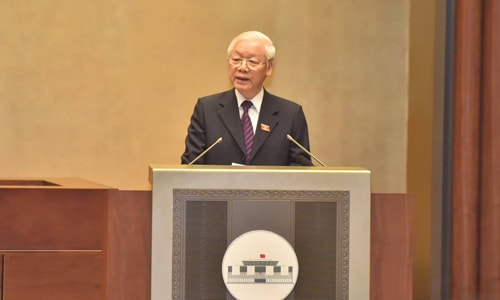President: Vietnam demonstrates strong commitment to innovation and international integration
(baonghean.vn) - Continuing the 6th session, on the morning of November 2, the National Assembly listened to the President report on the proposal for the National Assembly to ratify the Comprehensive and Progressive Agreement for Trans-Pacific Partnership (CPTPP) and related documents.
Presenting the Report on the proposal to the National Assembly to ratify the CPTPP Agreement and related documents, General Secretary and President Nguyen Phu Trong said that on September 8, 2018, the Government issued Report No. 373/TTr-CP requesting the President to submit to the National Assembly to ratify the Comprehensive and Progressive Agreement for Trans-Pacific Partnership and related documents.
|
General Secretary and President Nguyen Phu Trong.Photo: Hoang Phong. |
General Secretary and President Nguyen Phu Trong emphasized that, based on the 2013 Constitution of the Socialist Republic of Vietnam and the 2016 Law on International Treaties, the President submitted to the National Assembly for consideration and decision to ratify the CPTPP Agreement and related documents as follows: With the consent of the Politburo and authorization of the Government, on March 8, 2018 in Santiago (Chile), the Minister of Industry and Trade signed the CPTPP Agreement and related documents with the Ministers in charge of economy of Australia, Brunei, Canada, Chile, Japan, Malaysia, Mexico, New Zealand, Peru and Singapore.
After signing the Agreement, the countries will carry out domestic legal procedures, including ratifying the Agreement in accordance with their domestic laws for the Agreement to come into effect.
According to the President, participating in and early ratifying the CPTPP helps Vietnam demonstrate its strong commitment to innovation and comprehensive, deep international integration; affirming Vietnam's important role and geopolitical position in the Southeast Asian region, as well as the Asia-Pacific region.
“In the context of the rapidly changing, complex and unpredictable political and security situation in the world and the region, joining the CPTPP truly enhances the country's position, helping Vietnam to improve its internal strength to respond, consolidate its position to implement an independent, self-reliant, multilateral and diversified foreign policy, along with strengthening and enhancing national defense and security," said the President.
In addition, when implemented, the CPTPP Agreement will contribute to enhancing the intertwining of interests and deepening the relationship between Vietnam and CPTPP member countries, especially countries with strategic partnerships with Vietnam.
“Based on the Government's proposal and pursuant to Clause 14, Article 70 of the 2013 Constitution of the Socialist Republic of Vietnam and the 2016 Law on International Treaties, the President respectfully requests the National Assembly to consider and decide to ratify the CPTPP Agreement and related documents at the 6th session of the 14th National Assembly,” said General Secretary and President Nguyen Phu Trong.
“The countries have decided to postpone some groups of obligations that are considered to have a high level of commitment, but overall this agreement is still considered a high-quality, comprehensive FTA with the deepest level of commitment ever,” President Nguyen Phu Trong assessed.
The CPTPP Agreement consists of 7 articles and 1 annex regulating the relationship with the Trans-Pacific Partnership Agreement (TPP) signed by 12 countries on February 6, 2016 in New Zealand, as well as handling other issues related to the validity, withdrawal from or joining the CPTPP.
Basically, CPTPP maintains the content of the TPP agreement but allows member countries to postpone 20 groups of obligations, of which 11 obligations are related to the Intellectual Property Chapter, 2 are related to Government procurement and 7 are related to customs management and trade facilitation, investment, cross-border trade in services; financial services, telecommunications, environment, transparency and anti-corruption...
The CPTPP Agreement will take effect on December 30 as six countries have officially ratified it, including Mexico, Japan, Singapore, New Zealand, Canada and Australia.
In addition to the advantages, President Nguyen Phu Trong also said that joining the CPTPP poses challenges in terms of socio-economics, budget revenue, and improving the legal and institutional framework. Opening up economic activities, along with regulations on labor, transparency, and anti-corruption, requires Vietnam to be proactive and make efforts to innovate, continue to improve legal regulations, and establish management mechanisms to comply with international treaties while also ensuring political and social stability.

General Cuong: Challenges and opportunities when Vietnam joins CPTPP
(Baonghean.vn) - Major General Le Van Cuong - former Director of the Institute for Strategic Studies of the Ministry of Public Security, discussed the advantages and difficulties when Vietnam joined the Comprehensive and Progressive Agreement for Trans-Pacific Partnership (CPTPP).


